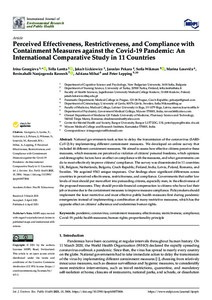Perceived Effectiveness, Restrictiveness, and Compliance with Containment Measures against the Covid-19 Pandemic: An International Comparative Study in 11 Countries
Georgieva Irina; Lantta Tella; Lickiewicz Jakub; Pekara Jaroslav; Wikman Sofia; Losevica Marina; Raveesh Bevinahalli Nanjegowd; Mihai Adriana; Lepping Peter
Perceived Effectiveness, Restrictiveness, and Compliance with Containment Measures against the Covid-19 Pandemic: An International Comparative Study in 11 Countries
Georgieva Irina
Lantta Tella
Lickiewicz Jakub
Pekara Jaroslav
Wikman Sofia
Losevica Marina
Raveesh Bevinahalli Nanjegowd
Mihai Adriana
Lepping Peter
MDPI
Julkaisun pysyvä osoite on:
https://urn.fi/URN:NBN:fi-fe2021093048688
https://urn.fi/URN:NBN:fi-fe2021093048688
Tiivistelmä
National governments took action to delay the transmission of the coronavirus (SARS-CoV-2) by implementing different containment measures. We developed an online survey that included 44 different containment measures. We aimed to assess how effective citizens perceive these measures, which measures are perceived as violation of citizens' personal freedoms, which opinions and demographic factors have an effect on compliance with the measures, and what governments can do to most effectively improve citizens' compliance. The survey was disseminated in 11 countries: UK, Belgium, Netherlands, Bulgaria, Czech Republic, Finland, India, Latvia, Poland, Romania, and Sweden. We acquired 9543 unique responses. Our findings show significant differences across countries in perceived effectiveness, restrictiveness, and compliance. Governments that suffer low levels of trust should put more effort into persuading citizens, especially men, in the effectiveness of the proposed measures. They should provide financial compensation to citizens who have lost their job or income due to the containment measures to improve measure compliance. Policymakers should implement the least restrictive and most effective public health measures first during pandemic emergencies instead of implementing a combination of many restrictive measures, which has the opposite effect on citizens' adherence and undermines human rights.
Kokoelmat
- Rinnakkaistallenteet [27094]
